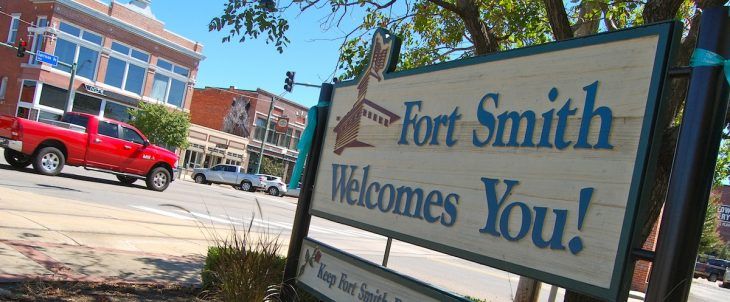Truckers warm to Propelling Downtown Forward plan, agree to support at Aug. 1 meeting
by July 18, 2017 5:37 pm 1,153 views

A business group representing the city of Fort Smith’s trucking industry has agreed to support the Propelling Downtown Forward strategic development plan after a compromise was reached on a truck traffic proposal.
The plan – developed by Dallas-based Gateway Planning and championed by 64.6 Downtown and the Central Business Improvement District (CBID) – met with pushback at a June meeting when presented in draft form to trucking-involved businesses. While CBID, the Fort Smith Board of Directors, and city’s Planning Commission were on board, trucking interests called for compromised and a place at the table.
They got it.
According to First National Bank of Fort Smith President and CEO Sam Sicard, “it was compromise, I would say.”
“One of the things we agreed to on the front end is there was language in there that had the option to restrict trucks coming over the bridge in effect to the local service delivery area – as an example, from South B to North B Street – so in essence, trucks could only come over to service that area and any others would have to go around I-40. That really concerned a lot of folks, but certainly the businesses on Wheeler Avenue. We agreed to strike that as an option.”
Sicard told Talk Business & Politics he and members of 64.6 Downtown “didn’t read it as a recommendation, just as an option, but we all talked about it and said, ‘You know, that’s not a realistic option. It creates too hard of a financial burden to those businesses.’ And that was probably the biggest change.”
Aside from that, Sicard said, the agreement “emphasized as recommended in the plan a working group of all the stakeholders involved, which would include the business owners of trucking companies or businesses that have trucks coming over. They would be involved in that group to help develop long-term solutions.”
One area of common ground, Sicard added, is that trucking-related businesses share an interest in taking Riverfront Drive off the truck route eventually. At present, “They don’t believe there is a good alternative, and that there does need to be a long-term plan to accommodate them. They even said they agree that, as development occurs with the U.S. Marshals Museum and the soccer fields and all the other things we hope to go down on the Riverfront, that they’ll be interested in not going that way. They don’t wish to see that become heavy traffic or an unsafe area.”
Sicard said the next step is “to continue these discussions with the city on that issue.”
Russ Bragg of OK Foods was in attendance as Sicard announced the agreement on Tuesday (July 18) at a CBID meeting. Bragg did not stay around for comment, but said publicly that his colleagues were in agreement. “I agree we will have our group there to support the plan” when it goes back before the city’s Board of Directors on Aug. 1.
Bragg has demonstrated a willingness to negotiate with downtown stakeholders over truck traffic in the past. OK Foods, in particular, has financed and conducted traffic count studies since 2001. One such study from 2016 found 5,660 trucks moved over the trucking route during a one-week period.
“When I look at the study compared to 2014, we’ve actually decreased the amount of trucks by about 550 trucks,” Bragg said.
